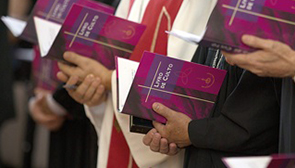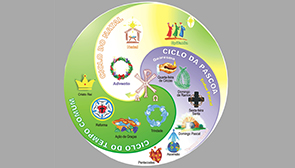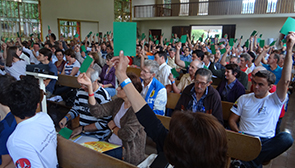Bible Study 5
Pastora Karen Ninnette Castillo
Iglesia Luterana Agustina de Guatemala
Traducción: Elisa Pérez Trejo.
Luke 10:25-37. The good Samaritan
We cannot be neutral! Jesus´ proposal to Solidarity.
It is not enough to be almost persuaded, nor is it enough to decide what you are going to do something ... but later. You may be almost persuaded, but you're lost! You can take as long as you want to be neutral, but that will ensure you a less meaningful place for your own life and that of others!
Being neutral is easy. You can be neutral every Sunday in church, it is not very comfortable, but it can be done, maybe you are waiting for someone else to make the decision, because you have never been the first to do something.
Being neutral brings a feeling of dissatisfaction and fear, that fear have been instilled in us, women, for centuries and centuries, and for that same fear we become neutral and by feeling we lose the great opportunity to be in solidarity.
Although the word solidarity does not appear in the Gospels, they undoubtedly invite us to practice it as an expression of universal love without barriers of any kind.
We can say the closest word to the word solidarity is agape, which appears 116 times in the New Testament. With this is indicated in the love that has or has as its object to God, or humanity in fulfillment of the divine precept: “The man answered: You shall love the Lord your God, with all your heart, with all your soul, with all your strength and with all your mind; and you will love your neighbor as yourself ”Luke 10:27. And Jesus answers: “Excellent answer! Do this and you will live ”Luke 10:28
The principle of solidarity is clearly formulated in Matthew 7:12, which is the text called the “golden rule”, where Jesus summarizes the Old Testament with this phrase: “So in everything, do to others what you would have them do to you, for this sums up the Law and the Prophets”. Jesus invites us to be in solidarity, or what is the same, to put ourselves in the other's place, as if we were ourselves, doing with the other what one would like them to do to him. To do this egocentrism must be renounced.
It must be taken into account that the field of Christian love goes beyond solidarity, because it includes the entire positive relationship between people: justice, generosity, respect, understanding, tolerance, help, affection, dedication , among many others actions that build unity among human beings. Therefore, solidarity is one of the manifestations of love that leads us to merge and identify with the other.
Now, in this parable Of the Good Samaritan so common and well-known, we must focus on Jesus' invitation to us, to solidarity love and to change the indifference to the pain of women around the world.
At first glance in the parable of the good Samaritan, several aspects stand out that I mention below:
• The Samaritan took great risks V. 30 and 35
• Overcome the hostility between Jews and Samaritans
• He did not calculate his obligations, but he let his heart speak
• This man let God love through him, before giving him the gift of his good works
Jesus introduces us to the other, and makes us think beyond any concern of archaic learning, and shows us a new way of thinking about what true love is, which is born from a deep inner call and stronger than danger, a love that does not stop even if the risks are taken, to stop being neutral and become in solidarity with our sister beaten, abused, who suffers, for the disappeared, the marginalized and the minimized in their roles of leadership; demonstrate rejection of all forms of violence that exist against women and girls.
This wounded man, lying on the side of the road, is the living representation of all the women who have suffered violence firsthand, and the Good Samaritan, is the representation of those who act regardless of the risks that this implies, overcoming barriers , leaving God to love through us, to act coherently with the message that we preach.
Let us reflect:
1. What does solidarity mean in my context?
2. Am I neutral or supportive?
3. How can I impact my environment to transform environments of neutrality and indifference, towards a call for solidarity?
Let us remember that all women, at some point in our lives, have been lying on the side of the road, and at some point we have also been the good Samaritan. The important thing here is to act, not to remain stranded or allow anyone else to remain lying on the side of the road, and to come out stronger all together to change neutrality for solidarity.






















